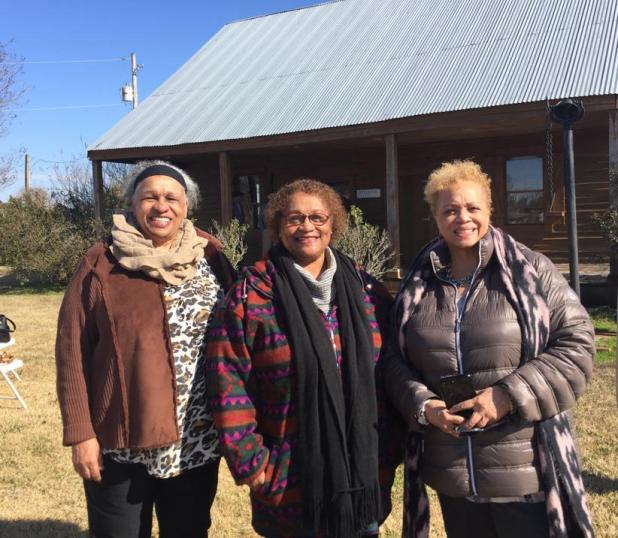
Descendants of Solomon Northup, (from left) , Eileen Jackson, Cynthia Jackson and Vera Jackson Williams, visit the Epps House, which Northup helped to build in 1852 when he was a slave on the plantation near Bunkie. The house has been relocated to the LSUA campus near Alexandria and is a major site on the Northup Trail. during the Northup Freedom Day bus tour. The women took part in a bus tour of Northup Trail sites as part of the Solomon Northup Freedom Day event on Jan. 4.
Avoyelles commemorates 165th anniversary of Northup freedom from slavery
Last week’s commemoration of Solomon Northup’s release from slavery in 1853 shows “how we can take a wrong situation and make it a right situation,” a descendant of Northup said.
Vera Williams spoke on behalf of Northup’s family members during the ceremony in the Division “A” courtroom in Marksville on Jan. 4.
Northup was a freeborn black man living in Sarasota, N.Y., when he was abducted in 1841 and sold into slavery in Louisiana. He worked on plantations in Rapides and Avoyelles parishes for 12 years before he won his freedom Jan. 4, 1853.
Williams, Northup’s great-great-great-granddaughter, thanked those who organized the Solomon Northup Freedom Day activities and for the “opportunity to participate in this awesome event.”
The courtroom ceremony followed a day-long bus tour of sites along the Northup Trail in Avoyelles and Rapides parishes. A new plaque at the courthouse was unveiled and dedicated.
After the ceremony, a reception was held at Bailey’s on the Square -- the site of Judge Ralph Cushman’s office in 1853. Cushman was the judge who signed the document ending Northup’s unjust and illegal enslavement.
Police Jury President Charles Jones told the courtroom audience that he grew up in Marksville but never heard Northup’s story until after he served 31 years in the Army and returned home.
“I had never heard this unbelievable and remarkable story,” Jones said. “A history teacher introduced me to this book, 12 Years a Slave, and I realized the story took place right here.”
NOT THE ONLY ONE
While Northup’s account of his experiences as a slave “made it difficult for me to put the book down,” Jones said he was also struck by Northup’s comments that he was not the only free black who suffered the same fate.
“He expressed concern for those who were not as fortunate as he was. They were once free but died in slavery,” Jones said.
The practice of kidnapping blacks in the North and selling them as slaves in the South was apparently common enough that the New York Legislature deemed it necessary to pass a law in 1840 -- the year before Northup’s abduction -- committing the state to help any African-American residents kidnapped into slavery.
Northup’s journey to freedom began when Sam Bass, a carpenter from Canada, was hired on the Epps Plantation near Bunkie. Bass was an abolitionist.
Northup told him his story. Bass sent letters to Northup’s friends in New York. They notified Northup's wife, Anne. She contacted attorney Henry B. Northup, the son of Solomon's father's former master.
Henry Northup contacted New York Gov. Washington Hunt, who appointed the state attorney general as his legal agent under the 1840 law.
Henry Northup arrived in Avoyelles and convinced Edwin Epps that it would be futile to contest Solomon Northup’s status as a free man. Epps ceded all rights of ownership and Cushman signed the documents freeing him from slavery. Henry Northup was assisted by local attorney John Waddill.
State Rep. Robert Johnson said the story of Northup illustrates the “challenge to be better people.”
He said the freeing of Northup in 1853 “was a trailblazing moment for this parish’s justice system and a trailblazing moment for this nation.”
FORMAL COMMENDATION
Johnson read a formal “expression of commendation” marking the 165th anniversary of Northup’s “attainment of freedom from slavery” and to “recognize his enduring legacy.”
The declaration also recognizes “the significant place that Mr. Northup holds in the history of Avoyelles Parish.”
Other special speakers included Carlos Mayeux, president of the Avoyelles Tourism Commission, and state Trails & Byways Chairman Doug Bourgeois.
Mayeux provided a history of the area’s interest in Northup’s story, from Dr. Sue Eakin’s efforts to bring the story to life with an annotated edition of 12 Years a Slave, to the creation of an 8-site Northup Trail in 1978 and the dedication of an expanded Northup Trail with new markers in 2015.
Bourgeois said the public’s interest in Northup, spurred in large part by the critically acclaimed movie based on Northup’s book, can be an economic benefit to communities.
“Visitors are interested in seeing real places, real people and real stories,” Bourgeois said. “Louisiana is full of stories -- both tragic and triumphant. This is one of those stories.”
The event was also used to observe the 90th anniversary of the courthouse, which was finished in December 1927 and dedicated on Jan. 10, 1928.
Jones noted the beauty of the courthouse and recalled how its many entrances added to beauty. As security concerns increased, access to the building was reduced to one door in the rear of the building.
“The building had to evolve,” Jones said. “It is sound -- so you don’t have to worry about it falling down on you,” he added with a laugh.
However, he continued, the Police Jury is concerned with”making sure the roof is intact and it doesn’t rain on the judges during trials” and other maintenance needs.
He said there are plans to renovate the 4th Floor, where the parish jail was located, and other projects to keep the courthouse operating.
